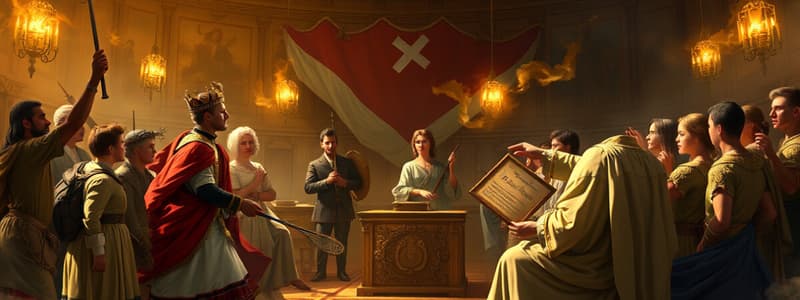Podcast
Questions and Answers
What was the Tennis Court Oath?
What was the Tennis Court Oath?
- A declaration of war
- A treaty signed between the Estates-General
- A royal decree issued by Louis XVI
- A pledge taken by Third Estate deputies to create a new government (correct)
When was the Tennis Court Oath sworn?
When was the Tennis Court Oath sworn?
June 20th, 1789
The Tennis Court Oath was created with the support of Louis XVI.
The Tennis Court Oath was created with the support of Louis XVI.
False (B)
Who wrote the Tennis Court Oath?
Who wrote the Tennis Court Oath?
Why is the Tennis Court Oath significant?
Why is the Tennis Court Oath significant?
What announcement did Louis XVI make on June 23, 1789?
What announcement did Louis XVI make on June 23, 1789?
What did Mirabeau declare during the Royal Session?
What did Mirabeau declare during the Royal Session?
What event occurred following Necker's dismissal on July 11, 1789?
What event occurred following Necker's dismissal on July 11, 1789?
What action did the king take that escalated tensions in Paris?
What action did the king take that escalated tensions in Paris?
Flashcards are hidden until you start studying
Study Notes
Tennis Court Oath
- The Tennis Court Oath was taken by deputies of the Third Estate on June 20, 1789, after being locked out of their meeting hall.
- Deputies gathered in a tennis court due to fears of a royalist conspiracy and pledged not to disband until a constitution was established.
- Emmanuel Sieyès wrote the oath, which was administered by Jean-Sylvain Bailly and signed by 576 deputies, with one abstainer.
- Revolutionary artist Jacques-Louis David depicted the oath, highlighting its historical significance.
- The Oath exemplified the Third Estate's determination and marked a transition towards a constitutional monarchy.
Significance of the Tennis Court Oath
- Represented escalating unrest against King Louis XVI and laid groundwork for significant events such as the Declaration of the Rights of Man and the storming of the Bastille.
- Central to the evolution of modern democracy in France, emphasizing popular sovereignty and national representation.
The Royal Session (June 23, 1789)
- Louis XVI annulled the formation of the National Assembly and insisted that estates meet separately unless otherwise permitted.
- Proposed equal taxation with Estates-General consent and promised to extend provincial assemblies across the kingdom.
- Mirabeau declared the deputies were present by the "will of the nation" and would only leave when forcibly removed.
- On June 24, soldiers meant to disperse the Assembly sided with them, showcasing popular support for the National Assembly.
Escalating Tensions in Paris
- King Louis XVI deployed 1,800 troops to Paris, escalating tensions with the populace.
- Mirabeau emerged as a leading agitator, advocating for the National Assembly.
- Louis blamed Jacques Necker for the failure of the Royal Session, leading to Necker's dismissal, which further fueled public anger against the king.
Necker's Dismissal (July 11, 1789)
- Necker was dismissed, inciting riots, looting, and public outcry in the streets.
- The Third Estate rallied under cries for Necker's reinstatement and against the King’s actions.
- Desmoulins, a prominent speaker, called for armed resistance to the monarchy, urging individuals to signify themselves as patriots by tearing leaves from trees.
- The dismissal intensified revolutionary fervor, leading to organized protests and food riots in Paris.
Studying That Suits You
Use AI to generate personalized quizzes and flashcards to suit your learning preferences.




